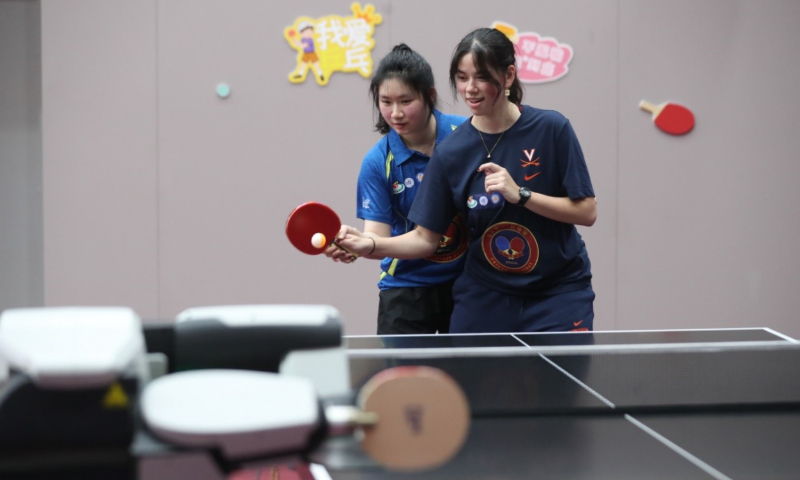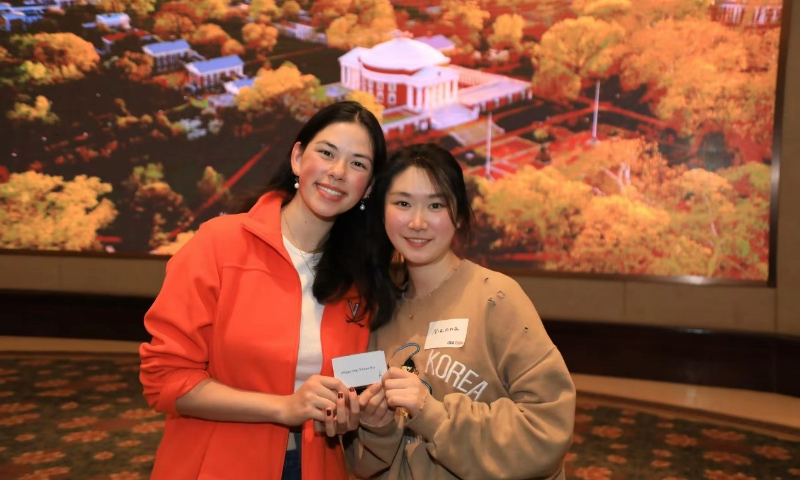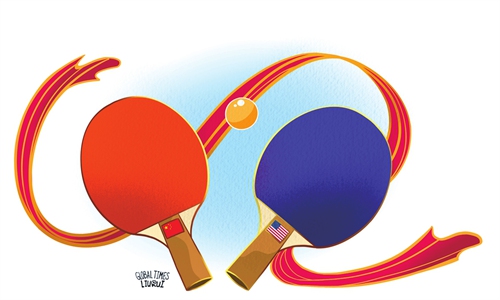IN-DEPTH / IN-DEPTH
Gen-Z Chinese, American players gain friendship in table tennis matches, add a vivid chapter to ‘Ping-Pong Diplomacy’
Future makers
Editor's Note:
The youth are the vanguards of our time, showcasing boundless energy and vibrant personalities.
Gen-Zers not only represent the makers of the future but also serve as agents of change in the present. With an open mindset and an international outlook, they actively integrate into the currents of globalization, engaging in deep exchanges, and collaborating with youth from around the world to explore pathways and strategies to address global challenges.
The Global Times has launched the "Voice from Gen Z" series, which focuses on the proactive actions and innovative achievements of young people in areas such as global governance, cultural exchange, environmental protection, and technological innovation. Through this column, we aim to showcase the unique charm and future leadership of global Gen-Zers.

At the International Table Tennis Federation (ITTF) Museum and China Table Tennis Museum in Shanghai, Wu Yiman held Abigail Barr's hands, and taught her how to catch the ping-pong balls served by a training robot in front of her step by step.
The two offered a contrasting image of the sport. While Wu has played ping-pong for 16 years and is a postgraduate student at the China Table Tennis College, Shanghai University of Sport, Barr, a sophomore at the University of Virginia (UVA), barely has experience in the sport. Minutes later, at the museum, the two participated in a friendly table tennis match between Chinese and US youth as partners.
With the match set to start, Barr continually expressed her apprehension to Wu, and each time Wu reassured the rookie.
"It's just a game," Wu said to Barr in English. "Have more fun."
Wu's words were magical. Of the two matches they had that day, Wu and Barr won the first, better than they had expected.
Moreover, the Chinese and US youth formed a valuable bond of friendship in just two short days of being together. "This was a far more precious present for me compared to the match result," Wu told the Global Times.
A surprising victory
Wu first met Barr the night before the friendly match, at a welcome dinner at a hotel in downtown Shanghai. "She was so beautiful and graceful," said the 23-year-old, recalling her first impression of Barr. "My eyes were involuntarily drawn to her."
Barr was among a US student delegation that came to China in early January for a China-US youth ping-pong exchange.
As the first batch of US youth visiting China under the program meant to "invite 50,000 US students to China over the next five years," the inaugural delegation hoped to promote better understanding between the two countries' younger generations, similar to "Ping-Pong Diplomacy" 53 years ago, a milestone in the history of China-US relations.
The delegation consisted of 12 UVA students, and a few teaching and administrative staffers from the university. They visited Hong Kong, Beijing, and Shanghai during their trip to China.
The friendly ping-pong doubles match was held in Shanghai on January 9, 2024. The young delegation members partnered with experienced local student players. They learned ping-pong skills from each other, and enhanced mutual understanding in cooperation.
Some of the US students have been playing table tennis for many years, while others, including the 20-year-old Barr, are newbies with little experience with the sport. In Wu's eyes, Barr was curious about table tennis, although she was reluctant to try at the beginning. "Barr told me that she was afraid she wouldn't play well and could 'drag me down' as a partner," Wu recalled.
That night after the welcome dinner, Wu wrote a letter to Barr to encourage her. "Don't be anxious about winning or losing the game," she wrote. "All I hope is that you can feel the friendship and the joy of sports."
The next day, before the friendly match, Wu took Barr to practice ping-pong in anticipation of their impending friendly match. The practice included trying the fancy training robot at the museum. Wu said she could feel that Barr was becoming increasingly positive about the match. "When she gradually discovered that she could intercept the ball by herself, she gained a sense of accomplishment, and her interest grew."
That day, when Wu and Barr won their first match, the two embraced joyfully and cheered, as though they had been partners for years. "We were very satisfied with this result," Wu told the Global Times. "It was a surprising victory."
The youth are the vanguards of our time, showcasing boundless energy and vibrant personalities.
Gen-Zers not only represent the makers of the future but also serve as agents of change in the present. With an open mindset and an international outlook, they actively integrate into the currents of globalization, engaging in deep exchanges, and collaborating with youth from around the world to explore pathways and strategies to address global challenges.
The Global Times has launched the "Voice from Gen Z" series, which focuses on the proactive actions and innovative achievements of young people in areas such as global governance, cultural exchange, environmental protection, and technological innovation. Through this column, we aim to showcase the unique charm and future leadership of global Gen-Zers.

Wu Yiman (left) helps Abigail Barr practice ping-pong in Shanghai on January 9, 2024. Photo: Courtesy of Wu and Barr
At the International Table Tennis Federation (ITTF) Museum and China Table Tennis Museum in Shanghai, Wu Yiman held Abigail Barr's hands, and taught her how to catch the ping-pong balls served by a training robot in front of her step by step.
The two offered a contrasting image of the sport. While Wu has played ping-pong for 16 years and is a postgraduate student at the China Table Tennis College, Shanghai University of Sport, Barr, a sophomore at the University of Virginia (UVA), barely has experience in the sport. Minutes later, at the museum, the two participated in a friendly table tennis match between Chinese and US youth as partners.
With the match set to start, Barr continually expressed her apprehension to Wu, and each time Wu reassured the rookie.
"It's just a game," Wu said to Barr in English. "Have more fun."
Wu's words were magical. Of the two matches they had that day, Wu and Barr won the first, better than they had expected.
Moreover, the Chinese and US youth formed a valuable bond of friendship in just two short days of being together. "This was a far more precious present for me compared to the match result," Wu told the Global Times.
A surprising victory
Wu first met Barr the night before the friendly match, at a welcome dinner at a hotel in downtown Shanghai. "She was so beautiful and graceful," said the 23-year-old, recalling her first impression of Barr. "My eyes were involuntarily drawn to her."
Barr was among a US student delegation that came to China in early January for a China-US youth ping-pong exchange.
As the first batch of US youth visiting China under the program meant to "invite 50,000 US students to China over the next five years," the inaugural delegation hoped to promote better understanding between the two countries' younger generations, similar to "Ping-Pong Diplomacy" 53 years ago, a milestone in the history of China-US relations.
The delegation consisted of 12 UVA students, and a few teaching and administrative staffers from the university. They visited Hong Kong, Beijing, and Shanghai during their trip to China.
The friendly ping-pong doubles match was held in Shanghai on January 9, 2024. The young delegation members partnered with experienced local student players. They learned ping-pong skills from each other, and enhanced mutual understanding in cooperation.
Some of the US students have been playing table tennis for many years, while others, including the 20-year-old Barr, are newbies with little experience with the sport. In Wu's eyes, Barr was curious about table tennis, although she was reluctant to try at the beginning. "Barr told me that she was afraid she wouldn't play well and could 'drag me down' as a partner," Wu recalled.
That night after the welcome dinner, Wu wrote a letter to Barr to encourage her. "Don't be anxious about winning or losing the game," she wrote. "All I hope is that you can feel the friendship and the joy of sports."
The next day, before the friendly match, Wu took Barr to practice ping-pong in anticipation of their impending friendly match. The practice included trying the fancy training robot at the museum. Wu said she could feel that Barr was becoming increasingly positive about the match. "When she gradually discovered that she could intercept the ball by herself, she gained a sense of accomplishment, and her interest grew."
That day, when Wu and Barr won their first match, the two embraced joyfully and cheered, as though they had been partners for years. "We were very satisfied with this result," Wu told the Global Times. "It was a surprising victory."

Wu Yiman (right) and Abigail Barr take a photo in Shanghai on January 8, 2024. Photo: Courtesy of Wu and Barr
Precious friendship
For Wu, the highlight of the friendly match was not their victory, but an impressive and friendship-filled moment at the end of the match.
That day, a few renowned former ping-pong champions, including Wang Liqin and Zhang Yining, were also present. Before the friendly match ended, when most members of the US delegation gathered around the champions for signatures, Barr came to Wu, inviting her to sign her new commemorative medal from the friendly match.
"I was almost moved to tears," said Wu. "I mean more to her than world champions."
Wu and Barr became good friends in less than two days of spending time together. They, as Wu said, are both extroverted and have a lot to talk about. Apart from table tennis, their topics ranged from family and growing up, to their respective universities and majors.
Barr told Wu that she once dreamed of being a top ballet dancer, and had spent much time on working toward this dream. "But unfortunately, she didn't realize this dream because of her injured knee(s)," Wu sighed.
Through these conversations, Wu was also delighted to find that Barr had much more interest in and knowledge of China than she had initially thought. Barr showed great command of intermediate Chinese and even had a Chinese tutor.
"Before meeting her, I spent a night cramming some professional English ping-pong terms, but later I only used a few of them," smiled Wu. "It's nice that we have no language barrier."
With family members living in China, Barr said she has been to China several times. On the day of the friendly match, Barr wore a mahjong-shaped earring, a Christmas present from her younger sister.
The UVA delegation left China in mid-January. Wu and Barr still keep in touch via WeChat and Instagram, sharing memes and fun details about their lives, and even sent each other best wishes over Chinese New Year.
Barr told Wu that she would come to China again. "I look forward to meeting her again in China soon," Wu said.
Vigorous envoys
In April 1971, the US ping-pong delegation conducted an ice-breaking visit to China at China's invitation. Prior to that, the two countries had had no official contact for more than two decades.
This was the start of the well-known "Ping-Pong Diplomacy," which paved the way for the normalization of China-US relations in those hard years filled with ideological confrontations.
Fifty-three years ago, young ping-pong players from China and the US jumpstarted the process of normalizing China-US relations in Beijing, hence the much-told stories of "the little ball being able to move the big ball" were shared by Chinese Foreign Ministry spokesperson Mao Ning at a press conference on January 9, the day when the friendly ping-pong match was held in Shanghai.
Mao mentioned the UVA delegation's visit, praising it as "adding new chapter to the stories of China-US friendship that began with Ping-Pong Diplomacy and new impetus for people-to-people exchanges."
Echoing Mao, Wu thinks that Chinese and the US Gen-Zers are vigorous envoys of the people-to-people exchanges between the two countries. Compared to older generations, younger generations are more open and inclusive, have more innate goodwill, and are curious about each other, she said.
Wu recalled that one of the UVA delegation members received a small gift with Chinese elements from his Chinese ping-pong partner - a Spring Festival couplet. "He was so excited and intrigued, that he kept asking us the meaning of the Chinese characters on the couplet."
Wu had met many young people from the US previously. At the international summer camps annually hosted by the China Table Tennis Collage, Wu guides young ping-pong players and enthusiasts from all over the world, including those from the US. She described the overall impressions that US students gave her: "Confident, humorous, and it's relaxing to be with them."
"They are similar to our Chinese youth," Wu concluded. "We are not so different. We are equally confident, friendly, and conversable."
Having played a receptionist role during the UVA delegation's visit to China, Wu is pleased to serve as a window for the US youth to know more about Shanghai and China. "I believe that the future belongs to the youth," she told the Global Times. "I hope that we Gen-Zers can lay a good foundation for the promising future of China-US relations."
A fan of the US musical Hamilton herself, Wu said she is very interested in the history, culture, and people in the US. She also looks forward to visiting the US in the near future, and taking a closer look at the country and making local friends.
"It would be even better to meet Barr again there," she smiled.


